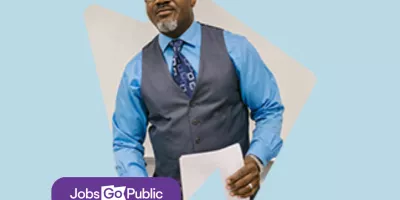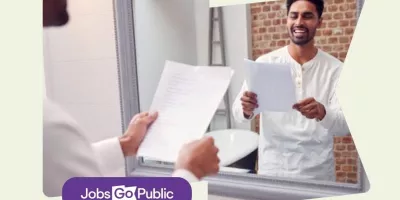
19 Jun 2023 ● Jobs Go Public
Common interview questions and answers (2025 UK guide)
The biggest mistake you can make in any interview is to turn up unprepared. It's like going to a race without training: you might get lucky and win, but you're more likely to place runner-up.
According to The UK Careers Fair, most companies in the UK now invite six people to interview, so it's important to stand out from the rest.
This comprehensive guide covers the most common interview questions, explains why recruiters ask them, and provides answer techniques such as the STAR method.
How to prepare for common interview questions
If you haven’t been to an interview in a while or are just starting your career, job interviews can be daunting. Here are some quick tips to help get you started with your preparation:
Research the employer
Before your interview:
- Read their website and 'about us' pages.
- Understand their services, goals, and values.
- Look up recent news or achievements to talk about in your interview.
- Check their social media presence.
Use the STAR technique
It can be helpful to have a structure for your answers to keep you focused on getting your point across without waffling. The STAR technique can be useful for behavioural questions.
Here’s how it works:
- Situation: Briefly describe the context of the situation.
- Task: Tell your interviewer what needed to be done.
- Action: Explain what you actually did.
- Result: Share the outcome of your actions.
See if you can spot this structure in our example questions!
For a more detailed explanation, you can also watch our webinar with Amy Andrews, who uses her 20 years of hiring experience to walk you through the STAR technique.

Public sector interview tip
If you're applying for a public sector role (e.g. local government, civil service, NHS), you may face structured, competency-based interviews. These will be aligned with frameworks like the Civil Service Success Profiles or the NHS Values.
! Use the STAR technique for most answers: this is often expected.
! Be ready to reference competencies or behaviours listed in the job description.
! Interviewers will assess evidence-based examples and may ask follow-up questions to dig deeper.
Practice your answers
It can be helpful to practice the questions before your interview to build your confidence. You can check out our guide to mock interviews, or get started with these quick pointers:
- Prepare 2-3 examples for each question type (personal background, behavioural, strengths etc.).
- Practice out loud with friends or family posing as your interviewer.
- Time your responses (aim for 1-2 minutes each).
- Record yourself to improve on your delivery.
Standard interview questions every candidate should know
Ready to get started? Here are 15 common interview questions every job seeker should be prepared for.
About you: Personal background questions
1. Tell me about yourself
Recruiters often start with this question to get an impression of your personality and whether you fit the company's culture. The question also acts as a test to determine your communication skills by how well you articulate your skills and experience.
Alongside your key skills and experience, talk about your hobbies and interests outside of work to build a relationship with the hiring manager:
Example answer:
"My name is Tom, and I grew up in London. My mother is a nurse, and my father is a teacher, which inspired me to join the public sector and pursue a career in education. I've worked in the sector for three years now in primary education and I love what I do.
Outside of work, I enjoy playing five aside football, cooking and landscape photography. I'm a hard worker and always eager to learn new things. I'm also a team player and enjoy helping my colleagues."
2. Why should we hire you?
This question allows you to summarise your key strengths and explain how they directly benefit the employer. Focus on what makes you unique and how you can solve their specific problems.
Example answer:
"You should hire me because I bring a unique combination of technical expertise and strong communication skills that would benefit your team. In my previous role, I successfully led a digital transformation project that improved efficiency by 35% while training 50+ staff members on new systems.
I'm also skilled at translating complex technical concepts into simple terms that everyone can understand. Based on what I've learned about your current focus on modernising legacy systems and enhancing public engagement, I’m confident I can help drive these priorities forward while supporting capacity-building across teams."
Looking for some job application inspiration?
Check out our guide to crafting a top public sector CV.
About the company: Research-based questions
3. What made you want to apply for the role?
This interview question aims to find out if you've done your research on the organisation. Prepare for this answer by learning about your potential future employer's mission, history and culture. If you can show that your personal values complement the goals of the organisation, you will stand out as a good potential fit.
Example answer:
"I'm really excited about this opportunity because I've been following [employer name] for a while now and I'm really impressed with the work you have done in the social housing sector, in particular the recent work you have carried out as part of the government's social housing decarbonisation fund.
As someone who cares about improving the energy performance of housing stock in the UK, I would love to be a part of the team that is involved in the rollout of this imitative and others in the future."
Strengths and skills questions
4. What are your strengths?
Recruiters ask this question to assess what you are good at, what you’re passionate about, and what you can contribute to the company. They're looking for someone who is self-aware of their strengths and how they have used them to their advantage in the workplace.
Be specific and provide examples of how you have used your strengths in the past. You should also focus on strengths that are relevant to the role you are applying for.
Example answer:
"I believe that I am a skilled communicator and organiser. I can convey my own ideas clearly and concisely, and I am also a good listener who values the contributions of others. In my previous role, I was responsible for creating our monthly newsletter.
I displayed initiative by creating each feature and opening informal dialogue with staff in a clear way to customers as part of a wider content strategy. As a result, traffic from the newsletter to our product pages increased by 42% in the first quarter of 2022."
5. What are you most proud of?
Recruiters use this question to assess how ambitious you are and what skills have helped you to reach your goals. This provides you an opportunity to explain how your skills led to your success and whether your definition of success aligns with their company culture and values.
Example answer:
"I'm most proud of leading a stock condition survey programme that helped a housing association make investment decisions and significantly improve the quality of its homes. We had over 5,000 properties and a lot had outdated or inconsistent asset data, which made planning repairs and long-term investment challenging.
I worked closely with surveyors, IT teams, and compliance officers to implement a new digital asset management system and standardise data collection. The project improved the accuracy of our records and also helped identify key areas for targeted investment.
As a result, we secured additional funding, prioritised improvements in energy efficiency, and reduced our reactive maintenance spend by 20% over 12 months. I’m proud because this work directly supported better living conditions for residents and aligned with our commitment to long-term sustainability and regulatory compliance."

6. What's your greatest accomplishment?
This question allows you to showcase a significant achievement that demonstrates your skills, work ethic, and potential value to the employer. Choose an accomplishment that's relevant to the role and shows measurable results.
Example answer:
"My greatest accomplishment was implementing a new customer service training program at my previous company. I noticed that customer satisfaction scores had been declining, so I researched best practices, designed a comprehensive training curriculum, and presented it to management.
After getting approval, I trained 40+ staff members across three departments. Within six months, customer satisfaction scores improved by 25% and complaints decreased by 40%. The program was later rolled out company-wide and I was promoted to Senior Customer Service Manager."
7. What's your management style?
Employers may ask this question because they want to understand your leadership potential and how you work with others. In your answer, you should focus on collaboration, communication, and results.
Example answer:
"My management style is collaborative and supportive. I believe in setting clear expectations and giving my team the independence to achieve their goals while being available for guidance when needed.
For example, when I was leading a project team of five people, I held weekly check-ins to discuss progress and challenges, but I also encouraged team members to take ownership of their specific areas.
I found that this approach led to higher job satisfaction and better results. We completed the project two weeks ahead of schedule and received positive feedback from all stakeholders."
Interview questions about weaknesses
8. What are your weaknesses?
Recruiters ask about your weaknesses to find out if you're self-aware of your skills gaps and whether you're willing to improve them. They also want to assess how you handle challenging situations at work and whether you have the interpersonal skills to work as part of a cohesive team.
While it's important to link your strengths to the role you're applying for, when it comes to a weakness try to list one that won't directly affect the role.
Example answer:
"One of my weaknesses at work is that I sometimes have trouble speaking up in meetings, even when I have something valuable to contribute. I've been working on this by being more assertive in smaller groups and role-playing with friends and family.
I've also become more mindful of my body language in meetings and I recognise that my contributions can add value to discussions."
Behavioural interview questions
9. Tell me about a time you overcame a difficult work situation.
Behavioural questions like this are commonly asked to assess skills like critical thinking, communication, problem-solving and time management. Answer them in the STAR format, addressing the situation you had to deal with, the task at hand, the actions you took and the results of your efforts.
Example answer:
"I was teaching a KS2 class of 30 and one of the students was struggling to keep up with the material and was becoming disruptive. I had to find a way to help the student without disrupting the rest of the class.
I set up a one-to-one chat with the student to find out what they were struggling with specifically and we set up a personalised plan which involved some extra help during the week. As a result, the student started to become more confident in class and they were able to understand the material and participate more actively."

10. How do you stay motivated?
Employers want to find candidates who will be enthusiastic and engaged at work each day, so they need to know if you'll stay motivated over the longer term. To show your enthusiasm, give specific, real-life examples of times that you've felt motivated at work.
Example answer:
"I stay motivated at work by setting goals for myself and tracking my progress. I set a goal to increase my quarterly sales by 10% and created a plan to achieve my goal, which included setting specific targets for each month. I analysed my progress towards my goal on a weekly basis by using a spreadsheet to track my sales and compare my results to my targets. I was able to achieve my goal and increase my sales that quarter by 12%."
11. How do you handle stress?
Roles in the public sector can be rewarding as they make a difference to the wider community. Employers want to know you can remain calm and productive under pressure when delivering these services. Show specific strategies you use to manage stress and provide examples of when you've successfully handled stressful situations.
Example answer:
"I handle stress by staying organized and prioritizing my tasks. When I feel overwhelmed, I take a step back and create a clear action plan. For example, during a particularly busy period at my previous job when we had three major projects running simultaneously, I created a detailed timeline and broke each project into smaller, manageable tasks. I also made sure to take short breaks and practiced deep breathing exercises. This approach helped me deliver all three projects on time and to a high standard."
Career and employment history questions
12. Where do you see yourself in 5 years?
Hiring managers want to know if you're likely to stay long-term or if this job is a stepping stone in your career journey. Even if you're not planning to make this job your career, talk about how your goals align with the company's mission. Share specific goals that you have for yourself and be positive about your ambitions for the future.
Example answer:
"In five years, I see myself as a certified nurse anaesthetist working in a busy hospital. I'm particularly interested in working in the operating room, and I'm excited about the opportunity to provide anaesthesia care to patients who are undergoing surgery, and opportunities to teach and mentor other nurses.
I've been working towards this goal for the past few years. I have a degree in medicine recognised by the General Medical Council and have completed a two-year foundation programme of general training."
13. Why are you leaving your current job?
This question helps employers understand your motivations and whether you're likely to be satisfied in their role. Be honest but positive, focusing on what you're looking for rather than something you may be trying to escape.
Avoid speaking negatively about your current or past employer. Even if your reasons are valid, criticism can come across as unprofessional and may raise concerns about your attitude or ability to work through challenges constructively.
Example answer:
"I've really enjoyed my current role and have learned a great deal, but I'm looking for new challenges and opportunities to grow my skills in [specific area]. While my current position has been valuable, I feel I've reached a point where I'd like to take on more responsibility and work on larger-scale projects. This role appears to offer exactly those opportunities, particularly in [specific aspect of the job], which aligns perfectly with my career goals."
14. What salary are you looking for?
Typically, in the public sector roles salaries will be tied to a pay scale and limited by the grade of the role you are applying for. This provides limited room for negotiation, but you may still be asked to confirm if you’re comfortable with the range or for benchmarking purposes.
Research typical salaries for the role in your region beforehand and be prepared to discuss your expectations. For advice on how to do this, check out our guide to comparing public sector salaries.
Example answer:
"I'm aware that the role is graded at [Grade/Band X], and I'm comfortable with that range. For me, the main motivation is the opportunity to contribute meaningfully in a role that aligns with my values and experience. That said, I'm happy to discuss any salary specifics if needed in line with the organisation's policies."
Questions to ask the interviewer
15. Do you have any questions for us?
This can be disarming, as you may have spent your preparation time thinking about how to sell yourself. However, this is an opportunity to assess if the role is right for you too.
Always have thoughtful questions prepared. This shows your genuine interest in the role and company.
Good questions to ask:
- What does a typical day look like in this role?
- How do you measure success in this position?
- What are the biggest challenges facing the team?
Need some more ideas of what to ask your interviewer?
Don't miss our article on the power of asking questions in an interview!
Additional interview preparation tips
Whether you’re applying for a role in local government, the civil service, education, or a nonprofit organisation, how you prepare for the interview can make a lasting impression.
Below are some key tips to help you feel confident and present yourself in the best light: before, during, and after the interview.
What to bring to your interview
- Multiple copies of your CV – in case you meet multiple interviewers or a panel.
- A notebook and pen to jot down key details about the role.
- Questions to ask the interviewer - Asking thoughtful questions demonstrates genuine interest in the role and organisation.
- A portfolio of your work (if relevant) - For creative, technical, or strategic roles, bring samples of your work to showcase your capabilities.
- References (if requested)
On the day of the interview
Your first impression matters, and that can be shaped within the first few minutes. Here are some pointers to help you approach the day with confidence:
- Arrive 10-15 minutes early - Punctuality shows respect for the interviewer's time and gives you a moment to collect yourself.
- Dress appropriately for the company culture - Research the company’s dress code in advance and aim to dress slightly more formally than the everyday norm.
- Bring a positive attitude and smile - Enthusiasm is often remembered just as much as qualifications.
- Listen actively to questions - Don’t be afraid to pause briefly before answering to gather your thoughts.
- Ask for clarification if needed - It’s better to ask than to guess. This shows you're thoughtful and detail-oriented.
After the interview
What happens after the interview can reinforce a strong impression or even help to recover from a shaky one.
- Send a thank-you email within 24 hours - A brief, polite message thanking the interviewer(s) for their time helps keep you top of mind.
- Reiterate your interest in the role - Use the follow-up to briefly express why you're excited about the opportunity and how your skills match the position.
- Mention any important points you may have missed - If there was a point you forgot to raise, this is your opportunity to include it.
- Be patient while waiting for a response - Many organisations, especially in the public sector, follow set recruitment timelines. Wait the advised time before checking in.
Preparing for an interview can be scary, but with the right approach, you can walk in feeling confident, organised, and ready to make a great impression. From polishing your CV to knowing what to bring on the day, every small step contributes to your success.
Remember: interviews aren’t just about answering questions. They’re an opportunity to connect, show your value, and learn whether the role is the right fit for you.
Take time to prepare, reflect on your strengths, and trust in the experience you bring. Good luck!
Updated 10 July 2025


